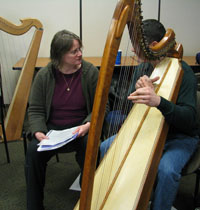 The next two-year training begins September, 2012.
The next two-year training begins September, 2012.
Application deadline is May 1, 2012.
Students will have received over 600 contact hours upon completion of this two year, non-degree training, which includes 20 didactic weekend intensives in Portland, Oregon and clinical internships. The training is designed to prepare students to meet the Standards and Competencies of the Music-Thanatology Association International (MTAI), the independent certification body for music-thanatology worldwide. Visit the Music-Thanatology Association International website (www.mtai.org) for more information.
Clinical Internships:
Students will begin a five hour a week internship in a hospital or hospice setting during the second term of their two year training which will continue until the student has completed 300 hours of on-site experience. During this extended work experience students will work one-on-one alongside an MTAI certified Music Thanatologist mentor. Through co-op, students connect theory and practice, develop skills, expand career knowledge, and make contacts for the future. Work schedules and work sites vary. Students must pass a background check, drug screen, and have current immunizations to be eligible. This internship is facilitated by Cooperative Education (co-op) and is three regular college credit courses of three credits each. Contact Tamara Pinkas, Cooperative Education Coordinator, 541.463.5011, pinkast@lanecc.edu.
Academic Program:
Our faculty consists of MTAI certified music-thanatologists, medical doctors, registered nurses, and other professionals who work closely with music-thanatologists. The training includes a contemplative component in which each student is supported to grow in their own personal and spiritual life.
Areas of study include, but are not limited to:
Anatomy of Religion and Ritual |
Anatomy of Religion and Ritual |
Students will have an opportunity to participate in annual concerts throughout the Pacific Northwest. These concerts are well-established and attract large audiences.
Admission to the program is by application *(.pdf) only. The next two-year training program begins in September, 2012. Application deadline is May 1, 2012. Download the Music Thanatology application.*
For more information, please contact Sharilyn Cohn.
*(requires Adobe Reader to view)
What is Music-Thanatology?
Music-thanatology is a professional field within the broader subspecialty of palliative care. It is a musical/clinical modality that unites music and medicine in end of life care. The music-thanatologist utilizes harp and voice at the bedside to lovingly serve the physical, emotional and spiritual needs of people who are terminally ill or dying, and their loved ones, with the prescriptive delivery of music.
Prescriptively delivered music is live music that responds to the physiological/existential needs of the patient moment by moment. For example, by observing vital signs such as respirations, heart rate, and temperature, the music-thanatologist provides music that is tailored to each specific situation. The warmth of this living music can bring solace, dignity and grace to those nearing the ultimate journey at the end of life.
Prescriptively delivered music can help ease physical symptoms such as pain, restlessness, agitation, sleeplessness and labored breathing. It creates an atmosphere of serenity and comfort that can be profoundly soothing for those present. Difficult emotions such as anger, fear, sadness and grief can be relieved as listeners rest into a musical presence of beauty, intimacy and compassion.
Music-thanatology is not intended to entertain or distract the patient. Instead, it allows the patient to enter into the unbinding process of letting go in his or her own very personal way. It affords families a chance to be with their loved one in a very intimate yet safe atmosphere where words are not necessary, and words that are spoken come from deep within, supported by the music.
Since antiquity, music and medicine have a long tradition as allies in healing. Music-thanatology is a contemporary field rooted in that same tradition. It has developed through the foundational work of Therese Schroeder-Sheker. Today, music-thanatologists practice throughout the United States and in several other countries around the world.
As medical technology becomes more advanced it is recognized that there is suffering that eludes even the most sophisticated medical treatment. Many physicians and caregivers welcome music-thanatology vigils as an integral part of care that offers an opportunity to relieve suffering and provide comfort.

See current schedule for classes offered this term
 |
 |
 |



